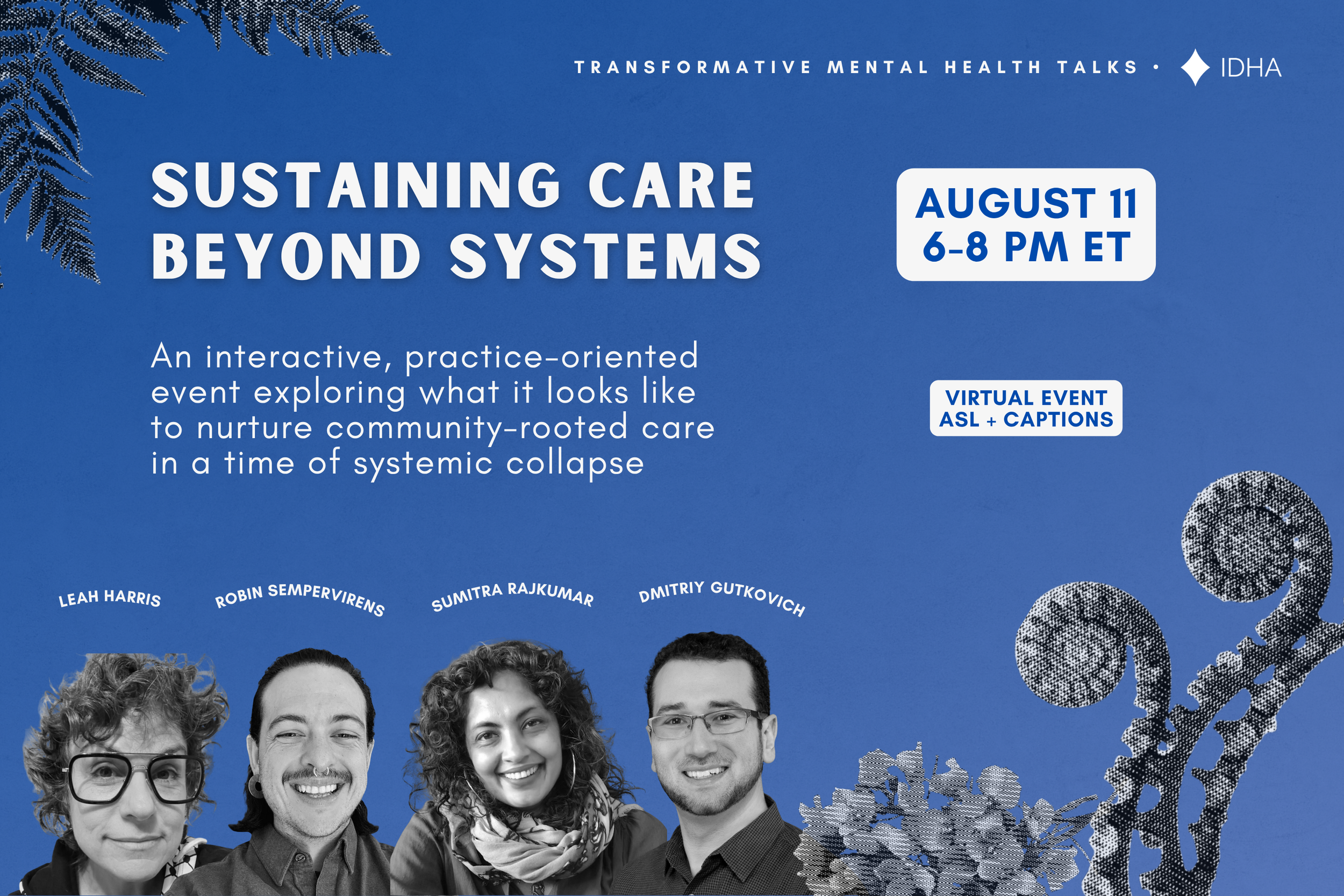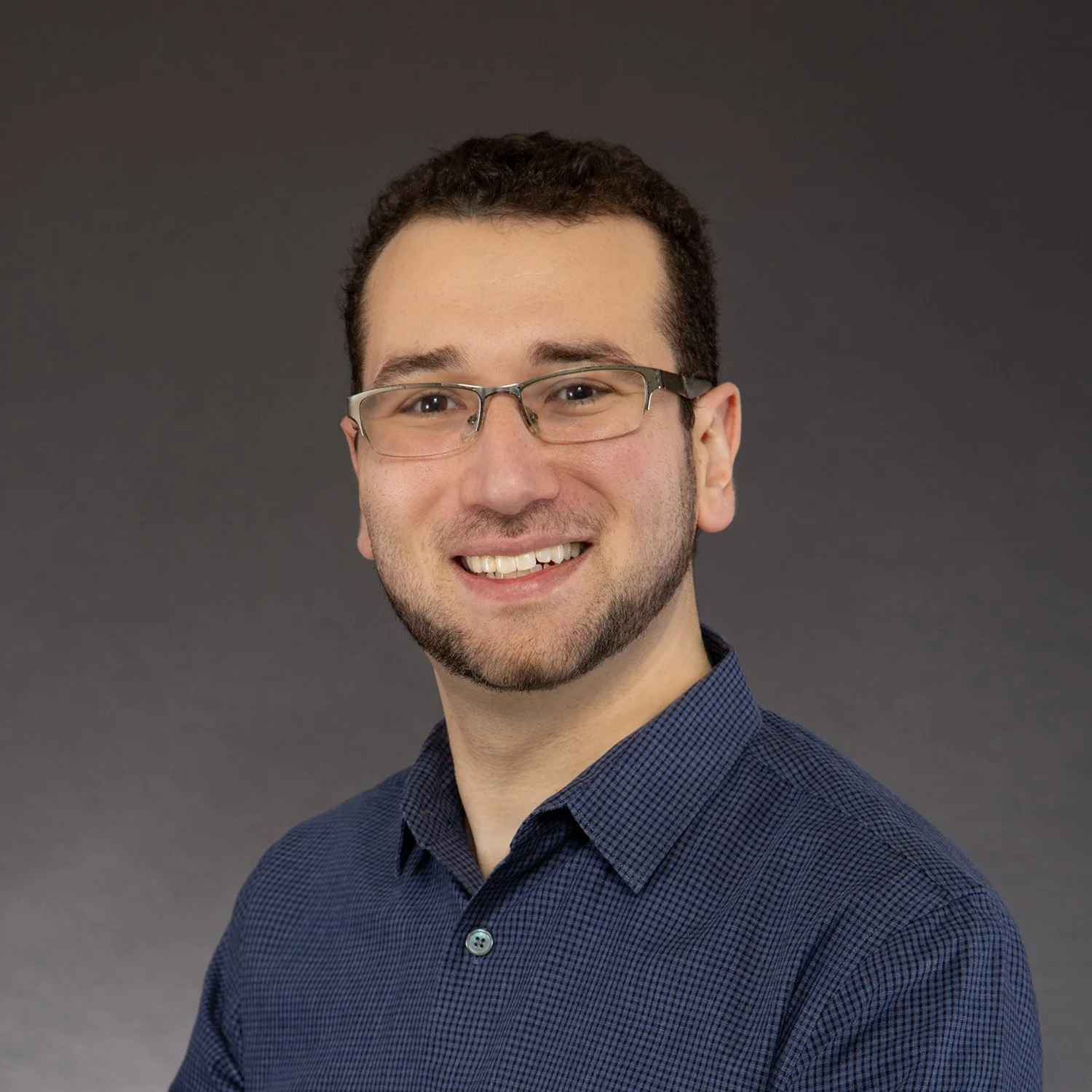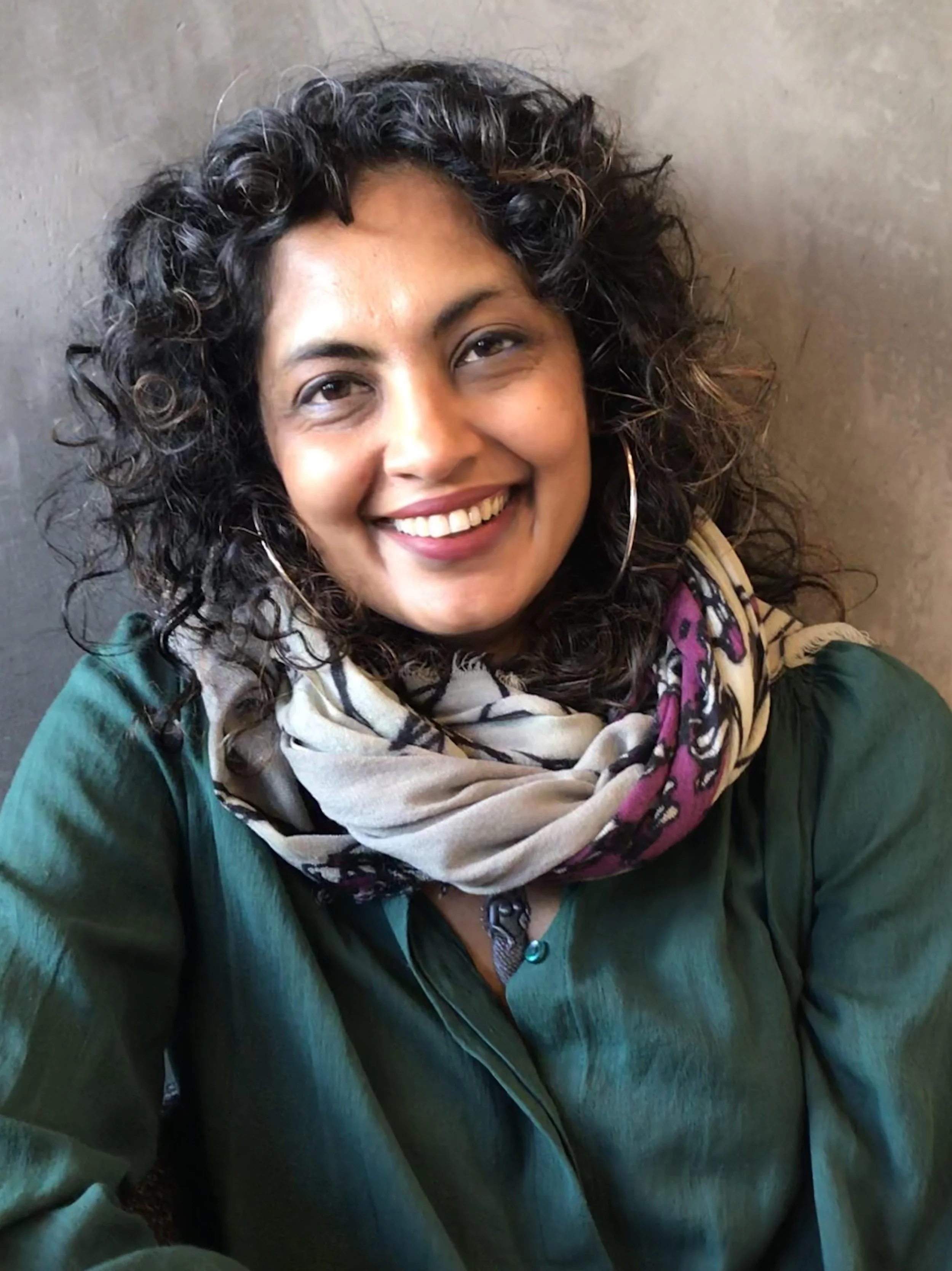About the Series
This event is part of an ongoing talk series inspired by IDHA’s Transformative Mental Health Core Curriculum. It features curriculum faculty and collaborators and dives into timely topics that intersect with our transformative mental health lens. Learn more about the series and access past recordings here.
About the Event
As public health infrastructure is gutted through sweeping Medicaid cuts, the proposed elimination of agencies like SAMHSA, and attacks on programs serving disabled and low-income communities, access to mental health care is becoming increasingly scarce. In this context, approaches rooted in community offer a vital path forward. These practices are not new; they have been created and sustained by Black, Indigenous, queer, trans, and disabled communities who have long cared for one another outside of institutional systems. While policymakers scramble to respond, mad and disabled communities already hold the knowledge we need: rooted in mutual aid, peer support, and generations of lived experience.
Join IDHA on Monday, August 11 for an interactive, practice-oriented event exploring what it looks like to nurture community-rooted care in a time of systemic collapse. The event will open with a grounding panel conversation, followed by breakout workshops that each offer a unique lens into transformative mental health practice. Whether you’re new to these ideas or deeply embedded in this work, this “choose your own adventure” format invites connection, reflection, and skill-building. We’ll close by coming back together to share insights across workshops, honoring the collective wisdom of our movements and the enduring possibilities of liberatory care.
This event is open to mental health workers and clinicians, researchers, educators, activists, survivors, peers, current and prior service users, writers, artists, and other advocates – anyone who is interested in exploring the link between personal and societal transformation.
Register in advance via Eventbrite to join. After registering, you will receive a confirmation email containing information about how to join.
Donations
IDHA is a small organization that strives to meet the accessibility needs of our community to the best of our ability. Our events are by tiered suggested donation to ensure we can provide closed captions on our events and other programs, though we strive to never turn anyone away. We appreciate donations of any size for those who have capacity to give.
Access
ASL interpretation + automated closed captioning will be provided. The event will be recorded and shared with all registrants. Please submit any additional access needs to contact@idha-nyc.org.
Workshops
Fifty years ago, our mad, abolitionist ancestors – our “madcestors” – envisioned collective care beyond systems, and viewed mutual support as explicitly and inherently political.
This workshop invites participants to reclaim this liberatory vision from decades of co-optation. We will dream and imagine care beyond systems, looking at abolitionist approaches like pod-mapping, mobile respites, and zine-making as acts of community care and information-sharing in an age of surveillance.
What if hearing voices isn’t just an individual experience, but part of a larger relational and communal ecosystem?
In this workshop, we’ll explore voice-hearing through the lens of internal and external relationships, and practice strategies for cultivating harmony and mutual understanding – within ourselves, and with those around us.
Each of us holds contradictions – between what we believe, what we feel, and how we move through the world.
In this workshop, we’ll turn toward those tensions using journaling, conversation, and embodied practice. Participants will reflect on a contradiction in their life and experiment with what becomes possible when we relate to it with curiosity and intention.
Supporting others through grief, uncertainty, or crisis requires presence, humility, and care.
This workshop will review a few supportive, non-judgmental communication strategies, such as mindful listening and open-ended questions. Participants will have space to practice these skills and reflect on how to show up for friends, loved ones, and others in a grounded and connected way.
Panelist/Facilitator Bios
Leah Harris
Leah is a mad, queer, and disabled writer, facilitator, and advocate of Ashkenazi (Eastern European) Jewish heritage. Their work focuses on autonomy and choice, surveillance/tech in the mental health/suicide prevention space, the history of carceral mental health, and psychiatric abolition. Their writing has appeared in The Progressive Magazine, Passengers Journal, Rooted in Rights, the Disability Visibility Project, and Mad in America; and in the anthologies We've Been Too Patient: Voices from Radical Mental Health, Fat and Queer: An Anthology of Queer and Trans Bodies and Lives, and the Mad Studies Reader.
Dmitriy Gutkovich
Dmitriy (he/him) has an extensive background in the hearing voices community, which includes leadership roles in nonprofit work (Hearing Voices Network-USA, ISPS-US, Hearing Voices Network-NYC, and NYC Peer Workforce Coalition), and authorship of Life with Voices: A Guide for Harmony. Leveraging over a decade of his own personal lived experience, his focus is on empowering voice-hearers in conversations on how strategies, support, and above all community can improve quality-of-life for those facing voice-related adversities.
Sumitra Rajkumar
Sumitra cut her movement building teeth in the racial justice uprisings of mid 90’s New York. The fierce collective dignity of those times instilled a lifelong commitment to justice. Over the course of multiple decades, she has produced documentary work with youth, run intergenerational popular and political education workshops, provided organizational support to a range of groups, and has been trained in and continues to innovate a practice in politicized forms of somatics — a method that connects personally embodied values to social transformation. She has applied this fifteen year practice to leadership development and therapeutic support for organizers, cultural workers, and social justice organizations. Sumitra now works at The Action Lab at the intersection of educational and cultural strategy through training methodology for social movements. Her labor of love is a fellowship called The Art of Purpose, weaving together the political, the emotive, and the creative as an organizing force towards a better world.
Robin Sempervirens
Robin (they/them/elle), LMSW, is a mixed, queer, trans/nonbinary therapist and artist. They have worked in direct services since 2019 and as a psychotherapist since 2022. Robin's clinical approach is not just focused on addressing individual suffering, but also recognizing and confronting the histories and systems that perpetuate trauma. Through liberatory, relational, somatic, and creative interventions, they strive to uplift their patient’s often overlooked strengths such as imagination, humor, community, ancestral/spiritual practices, and beyond. Outside of individual and couples’ therapy, they are also an experienced facilitator who has developed, facilitated and collaborated on group therapy, restorative/transformative justice processes, political education, and more. In all of their work, they offer intuitive curiosity and respect for each individual’s lived experience.
Moderator
Noah Gokul
Noah (they/them) is IDHA’s Program Manager. They are a Queer multidisciplinary artist and educator here to create liberated worlds through art, storytelling, and sound. They grew up in Oakland, CA/unceded Ohlone land, and identify as a trauma survivor with sensitivities to the world around them. They use music and art for meaning-making and the healing of others, integrating these passions into their work as a peer for young adults in a first-episode psychosis program. They have facilitated in a wide variety of settings, at the intersections of anti-oppression, trauma, incarceration, Caribbean ancestry, music, and mental health. Through their incantations they create spaces of radical imagination and possibility.










